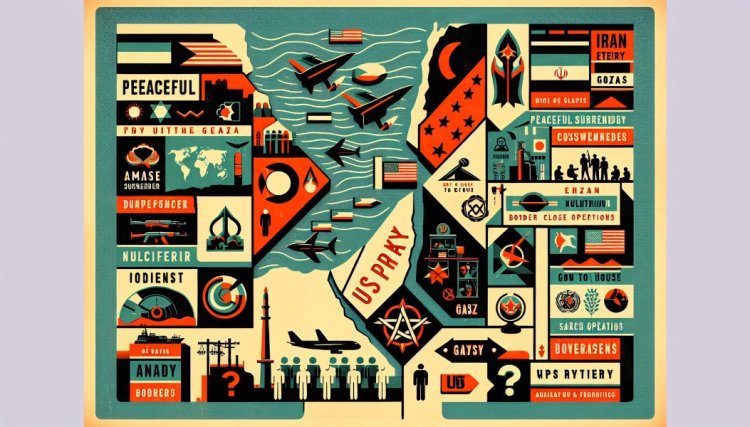The State of Play in the Middle East: Updates on Gaza, Iran, and US Proxy Attacks - 09/DEC/2023
"Stay informed with the latest updates on the complex geopolitical landscape in the Middle East. This article provides an in-depth analysis of the current state of play in Gaza, Iran's strategic position, and the implications of US proxy attacks, offering insights into the region's ever-evolving dynamics."

State of play in Gaza
Here are the latest updates on the situation in Gaza:
-
Reports have emerged of Hamas terrorists surrendering to the Israel Defence Forces (IDF). This is a significant development, as it indicates a loss of morale among Hamas fighters. The sight of their comrades surrendering may have a demoralising effect on other Hamas members, potentially shortening the duration of the war.
-
The mass surrender of Hamas terrorists could have a substantial impact on the length of the war. If more Hamas fighters choose to surrender, it could save many lives and expedite the pacification of Gaza.
-
The IDF has made considerable progress in pacifying northern Gaza, including Gaza City. While there are still pockets of Hamas resistance in the northern half of the strip, Israel is actively working to eliminate these pockets and gain full control over the area.
-
Israel is implementing various strategies to eliminate the remaining Hamas resistance. IDF soldiers are conducting house-to-house searches and raids as they have discovered that many civilian homes in Gaza contain weapons and terror infrastructure. This thorough approach is aimed at dismantling Hamas's capabilities and ensuring the safety of Israeli citizens.
-
Capturing Hamas leader Yahya Sinwar is of utmost importance to Israel. Sinwar is the mastermind behind the October 7th terror massacre and holds significant influence over Hamas's operations. His capture would be a major blow to the organisation and further weaken its ability to threaten Israel.
-
There are concerns about potential escape routes for the top Hamas leadership, including Yahya Sinwar. It is believed that their only viable escape route would be through Egypt via the Rafa border crossing. Israel is closely monitoring these potential routes and taking measures to prevent the escape of key Hamas leaders.
The ongoing developments in Gaza are significant and have the potential to shape the outcome of the conflict. Israel's progress in pacifying Northern Gaza and the surrender of Hamas fighters are positive signs that could lead to a quicker resolution of the conflict. The capture of Yahya Sinwar and the prevention of the escape of top Hamas leaders are crucial objectives for Israel to ensure long-term peace and security in the region.
Israel's goals in the campaign
Israel has a clear set of goals in its ongoing campaign against Hamas. These goals include:
-
Responding to Hamas' terror attack: Israel's campaign is a direct response to Hamas' deadly terror attack on October 7th. Israel is determined to defend its citizens and ensure their safety.
-
Momentum and advances made by Israel: The Israel Defence Forces (IDF) have made significant progress in pacifying northern Gaza, including Gaza City. This shows the momentum and advances made by Israel in gaining control over the area.
-
The objective of destroying Hamas: Israel's ultimate goal is to completely destroy Hamas as an organisation. This would mean eliminating Hamas' leadership and dismantling its capabilities to threaten Israel.
-
Challenges in achieving the goal: While Israel has made progress, there are still challenges in achieving the goal of destroying Hamas. Hamas continues to resist, and it has pockets of resistance in the northern half of Gaza.
-
Assessment of Israel's progress: Overall, Israel has made significant advances in the campaign. They have eliminated several Hamas commanders, gained control over Northern Gaza, and received valuable intelligence from surrendered Hamas fighters.
-
Long-term goal of ensuring security: Israel's long-term goal is to ensure the security and safety of its citizens. This requires not only defeating Hamas but also preventing the escape of top Hamas leaders and securing the border with Egypt to cut off potential escape routes.
Israel's goals in the campaign are clear and focused on defending its citizens, eliminating the threat of Hamas, and ensuring long-term security in the region.
Role of Iran and Hezbollah
Iran and Hezbollah play significant roles in the ongoing conflict in the Middle East. Here are some key points to consider:
-
Iran has been a staunch supporter of Hamas, Hezbollah, and other proxies in the region. They provide financial, military, and ideological support to these groups, enabling them to carry out attacks against Israel.
-
Hezbollah, Iran's most lethal proxy, has been responsible for multiple attacks on Israel from Lebanon. They have launched rockets, missiles, and anti-tank missiles, causing casualties and damage.
-
There is a potential for the conflict to escalate further with Hezbollah. If Israel continues to advance against Hamas in Gaza, Hezbollah may feel compelled to join the fight and open a second front in Lebanon. This could lead to a more intense and widespread conflict.
-
If Israel were to strike Iran's nuclear program, Iran's ultimate response could involve activating Hezbollah to launch a massive retaliation against Israel. This could include an onslaught of rockets and missiles targeting Israeli cities.
-
There are concerns over Hezbollah's losses in the ongoing conflict. As Israel continues to target their fighters and infrastructure, Hezbollah may suffer significant casualties. This could lead to increased desperation and a more aggressive response from Hezbollah.
-
Israel may consider a preemptive strike on Hezbollah to neutralize their capabilities before they can launch a large-scale attack. This would be a risky move, as it could provoke a broader conflict and further escalate tensions in the region.
The role of Iran and Hezbollah in the Middle East cannot be understated. Their support for Hamas, Hezbollah, and other proxies fuels the ongoing conflict and poses a significant threat to Israel's security. The potential escalation of the conflict with Hezbollah and Iran's ultimate response to a strike on their nuclear programme are major concerns. It remains to be seen how the situation will develop, but the actions of these actors will undoubtedly shape the future of the region.
US Proxy Attacks and Iranian Provocations
Recent events in the Middle East have highlighted the ongoing proxy attacks by Iranian-backed militias on US interests in Iraq and Syria. These attacks have raised concerns about the lack of deterrence from the US and the need for a change in approach to address this issue.
Iranian Proxies' Attacks on US Interests in Iraq and Syria
There have been a staggering 82 attacks by Iranian proxies against US personnel in Iraq and Syria since October 17th. These attacks have targeted US bases, the US Embassy in Baghdad, and coalition forces. Despite these repeated provocations, the US response has been limited, raising questions about the effectiveness of deterrence.
Lack of deterrence from the US
The lack of a strong and decisive response from the US has allowed these Iranian proxies to continue their attacks with impunity. This has emboldened them and sent a message that they can target US interests without facing serious consequences. The US must demonstrate a clear and unwavering commitment to protecting its personnel and interests in the region.
Need for a Change in Approach
The current approach of limited retaliation is not deterring Iranian proxies from carrying out attacks. A change in approach is necessary to effectively address this issue and protect US personnel. This could involve a more robust and proactive response, including targeted strikes on Iranian proxy networks and infrastructure.
Potential Actions the US Can Take
The US has several potential actions it can take to address the ongoing proxy attacks. These include:
-
Increasing intelligence sharing and coordination with regional partners to identify and dismantle Iranian proxy networks.
-
Imposing stronger sanctions on individuals and entities involved in supporting these proxy groups.
-
Conducting targeted strikes on Iranian proxy infrastructure to disrupt their operations and degrade their capabilities.
-
Enhancing the presence of US forces in the region to deter further attacks and protect US interests.
-
Engaging in diplomatic efforts to isolate the Iranian regime and rally international support for countering its destabilizing activities.
Impact on US Presence in the Region
The ongoing attacks by Iranian proxies pose a significant challenge to the US presence in the region. They undermine the security and stability of Iraq and Syria, and they threaten the safety of US personnel. If these attacks continue unchecked, they could lead to a further deterioration of the security situation and potentially force the US to reconsider its presence in the region.
Victims of the Iranian Regime's Actions
It is important to acknowledge the victims of the Iranian regime's actions. The Iranian people, who suffer under the oppressive rule of the regime, are the primary victims. Additionally, the attacks by Iranian proxies have resulted in casualties among US personnel and coalition forces, further highlighting the need for a strong and effective response.
Encouragement: Growth of Christianity in Iran
Despite the ongoing conflict and persecution in Iran, there is a glimmer of hope in the form of the growth of Christianity in the country. Here are some key points to consider:
-
Iran is home to the fastest-growing church in the world. Despite the risks and dangers, more people are coming to Christ in Iran than anywhere else.
-
The growth of Christianity in Iran is a testament to the strength of the gospel. Even in the face of persecution, people are finding hope and faith in Jesus Christ.
-
The underground Church in Iran continues to thrive. Despite the risks of being discovered and persecuted, believers are gathering in secret to worship and study the Bible.
-
Prayer is crucial for the persecuted Church in Iran. As Christians around the world, we should lift up our brothers and sisters in Iran, praying for their safety, strength, and courage in the face of persecution.
-
We should also pray for Iran as a nation. Pray for peace, understanding, and the spread of the gospel throughout the country.
The growth of Christianity in Iran is a powerful reminder that nothing can stop the gospel from spreading. Despite the challenges and dangers, believers in Iran are standing strong in their faith and spreading the message of hope to those around them. Let us join in prayer for the persecuted church and the people of Iran.



 admin
admin 










